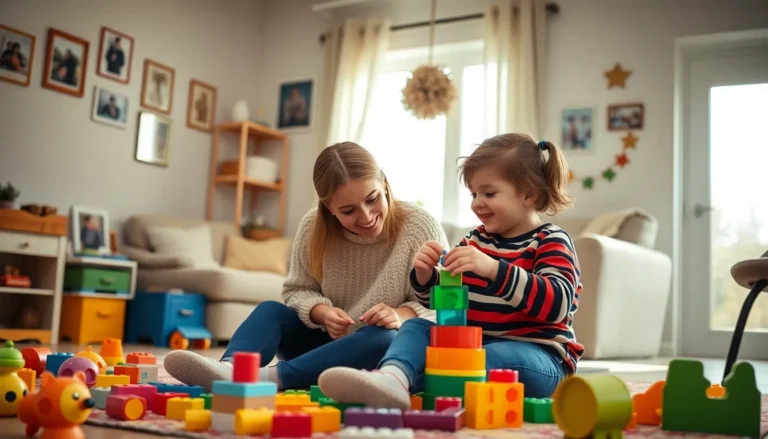Table of Contents
ToggleDivorce can feel like a chaotic circus, and when kids are involved, the stakes get even higher. Imagine juggling flaming swords while riding a unicycle—yeah, that’s parenting during a split. For many, taking a parenting class is a lifeline in this whirlwind, but what happens if you skip it?
Impact on Custody Arrangements
Not attending parenting classes during a divorce affects custody decisions directly. Courts prioritize the child’s best interests, often viewing participation in these classes as a sign of commitment to cooperative co-parenting.
Understanding Custody Decisions
Judges assess various factors when determining custody arrangements. A parent’s willingness to take parenting classes may influence their view of that parent’s commitment. They consider evidence of a parent’s ability to support the child’s emotional and developmental needs. Attendance in these classes can reflect the dedication to understanding parenting dynamics. If a parent skips this opportunity, courts might perceive them as unprepared or unwilling to cooperate.
Potential Consequences on Parenting Time
Failing to attend parenting classes can lead to reduced parenting time. Courts may impose less favorable arrangements if they determine a parent’s absence indicates a lack of commitment. The result may be supervised visitation or limited access to the child. Presenting oneself as less informed about co-parenting may also deter judges from granting equal parenting time. This can create ongoing challenges in establishing an equitable parenting plan.
Emotional Effects on Children
Not attending parenting classes during a divorce can significantly affect children’s emotional well-being. Children often experience instability and confusion amidst the changes in their family dynamics.
Short-Term Reactions
Children may display increased anxiety and stress immediately following their parents’ divorce. Feelings of abandonment often surface, especially if they perceive a lack of structure or support. Behavioral changes, such as acting out or withdrawing from social interactions, might occur frequently. Emotions can be overwhelming, leading to difficulty in expressing their needs. Immediate changes in routine, stemming from divorce negotiations, can also intensify these responses.
Long-Term Implications
Long-term effects may manifest as children struggle with issues related to attachment and trust. Persistent emotional distress can lead to problems in forming healthy relationships in adulthood. Mental health concerns, such as depression and anxiety disorders, become more prevalent among children who lack adequate support during a divorce. Academic performance may decline as emotional struggles hinder focused learning. Children might internalize conflict, impacting their overall development and self-esteem. Consistent participation in parenting classes supports healthier outcomes, fostering cooperation and stability.
Legal Ramifications
Not attending a parenting class during a divorce can hinder the court’s assessment of parental capability. Courts often view participation as a sign of commitment to cooperative co-parenting. Judges recognize the importance of emotional support for children. Those who skip classes may appear less dedicated, impacting custody outcomes.
Court Perceptions
Judges prioritize a parent’s willingness to invest in positive co-parenting practices. Courts assess participation in parenting classes as an indicator of a parent’s commitment. Skipping these classes can lead to negative perceptions, suggesting a lack of concern for the child’s well-being. As a result, parents uninvolved may face disadvantages in custody decisions. Favorable arrangements often favor those demonstrating a commitment to learning and growth.
Enforcement of Parenting Class Requirements
Courts enforce mandatory parenting classes in many states. When a court orders participation, noncompliance may lead to significant repercussions. Judges might impose modified custody arrangements or increased supervision for non-attending parents. Compliance generally reinforces a parent’s standing, while failure to comply can exacerbate challenges in custody disputes. Ultimately, attending these classes is crucial for safeguarding parental rights in a divorce setting.
Alternative Solutions
Skipping parenting classes during a divorce doesn’t mean parents have no options. Alternative solutions can provide valuable support during this transition.
Seeking Mediation
Parents can consider mediation as an effective method to resolve conflicts amicably. Mediators facilitate discussions, guiding both parents toward mutually agreeable solutions. This process fosters communication, eases tensions, and often leads to more satisfactory custody arrangements. Many jurisdictions offer court-appointed mediators, which can reduce costs. When parents actively engage in mediation, they demonstrate willingness to cooperate, potentially improving perceptions by the court regarding their commitment to their children’s well-being.
Resources for Parenting Support
Numerous resources exist for parents seeking guidance and support. Local community centers often provide parenting workshops, which can cover topics such as effective communication and coping strategies during a divorce. Online platforms offer virtual support groups and forums where parents can share experiences and advice. Child welfare organizations also provide valuable resources like counseling and educational materials tailored to navigating family changes. Engaging with these resources helps parents develop skills necessary to support their children during challenging times.
Not taking parenting classes during a divorce can lead to serious consequences for both parents and children. Courts often view participation as a commitment to cooperative co-parenting, and skipping these classes can negatively impact custody arrangements. This lack of involvement may result in reduced parenting time or even supervised visitation.
Children may also suffer emotionally from the instability created by parental decisions. Increased anxiety and behavioral changes can arise as they navigate the complexities of their new family dynamics.
Ultimately, engaging in parenting classes not only supports parental rights but also fosters a healthier environment for children. By prioritizing their children’s well-being, parents can create a more stable and supportive atmosphere during a challenging transition.




